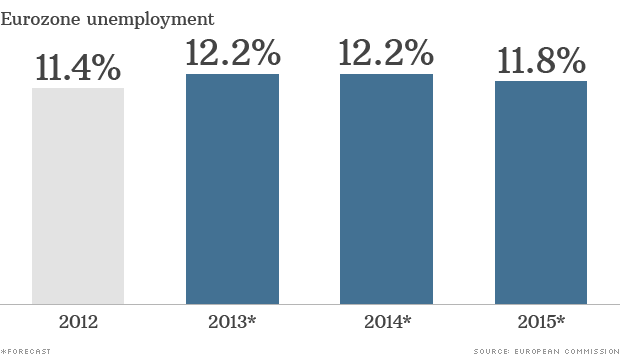
Europe's crisis is not over yet and
unemployment will stay at record levels above 12% until 2015, the European
Union said Tuesday.
The eurozone emerged from a recession lasting six quarters earlier
this year but has struggled to gain momentum since. The culprits: weak domestic
demand and a morechallenging environment for
exporters.
Gross domestic product across the 17-nation region will shrink
by 0.4% in 2013, after contracting by 0.6% in 2012.
"The recovery is expected to continue, and to gather some
speed next year. However, it is too early to declare the crisis over," the
European Commission said in its semi-annual economic forecast.
"External demand is expected to pick up over the coming
quarters, but less than earlier expected, on account of a weakened outlook for
growth in emerging market economies and the appreciation of the euro."
The euro hit a two-year high against the dollar last week.
The Commission trimmed its eurozone GDP growth forecast for 2014
to 1.1%, from 1.2% earlier this year.
The impact of harsh austerity measures in 2011 and 2012 has
begun to fade this year, and eurozone government spending will rise in 2014,
but paying down debt remains a priority for companies and households.
That means less money available for investment and spending, so
any recovery in domestic demand will be very gradual. Lending to companies
continues to contract, providing another obstacle to faster growth.
"We cannot yet declare victory, and must not fall into the
trap of complacency," Olli Rehn, the EU's top finance official, told
reporters.
Governments must stay the course of economic reform to boost
growth and create jobs,
he said.
Economists have called recently for the European Central Bank to
cut interest rates to a new record low -- as early as this week but by December
at the latest -- to reduce the risks of a Japan-style period of deflation and stagnation.
Deflation is a broad decline in the price of goods and services.
It can tip economies into a downward spiral as consumers and businesses delay
purchases in anticipation of further falls to come. It also increases the value
of debt, a big risk for the eurozone where government debt is expected to hit
96% of GDP next year.
Rehn said the risk of deflation seemed "remote" but
noted ECB President Mario
Draghi'srepeated commitment to act if necessary to support the
recovery.
Apart from making the right call on monetary policy, Draghi is
under enormous pressure to restore credibility in Europe's banking industry
with a 12-month health check of
the region's biggest lenders.
The ECB is due to assume responsibility for supervising Europe's
top banks late next year, a first step toward a banking union that policymakers
say is essential to repairing the damage created by the 2008 financial crisis.
Previous rounds of stress tests, including one in 2010, failed
to identify major weaknesses among some banks in countries including Spain and
Ireland.
Rehn said he believed the checks led by the ECB would be much
more rigorous.
"Mario Draghi has a very strong incentive not to receive
any crap in his hands," he said.
No comments:
Post a Comment